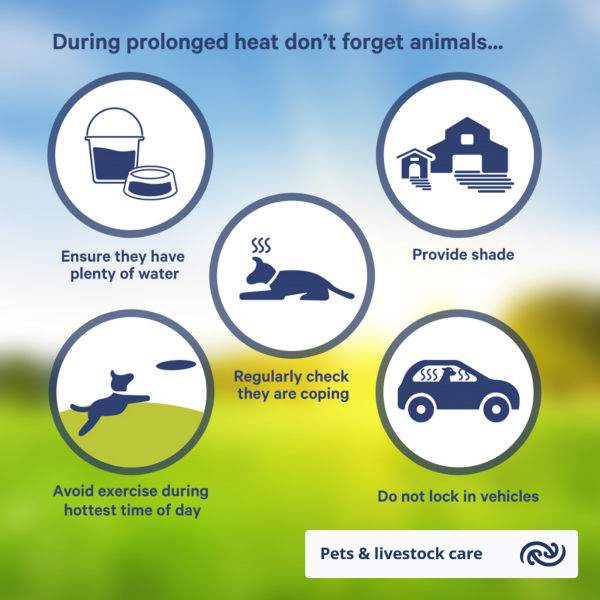Heat alert trial
Heat alert trial aims to help reduce health impacts from hot weather
Extreme heat during summer can be draining and have an impact on people’s daily lives – especially their health and wellbeing. Everyone is vulnerable to extreme heat. However, babies and infants, older people, those with pre-existing medical conditions or on certain medications are more at risk. International research shows that extreme heat and heatwaves can cause illness and death, but effective planning and actions can readily reduce its effects on health.
Over the last four years MetService has been trialling heat alerts to help New Zealanders plan and prepare for extreme heat, alongside our Civil Defence and Health partners.
In the summer of 2024-2025, 46 towns and cities were part of the heat alert trial, if the forecast temperatures were expected to be unusual (very hot) for that location. This alerting scheme is not designed to capture every hot summer day, but rather focus on ‘top end’ heat. The thresholds to trigger a heat alert vary a lot from one region to another – what is considered extremely hot for a Cantabrian is very different to what a Southlander will deem hot.
Heat alerts are issued from the start of December through to the end of February. When an alert is triggered a heat alert banner will appear on the respective forecast page on metservice.com and on the MetService weather app. In addition, MetService forecasters will include heat wording as part of the written forecast for that location. MetService may also use social media to generate awareness of a heat event.
Tips for managing in hot weather events
If you or others feel unwell
If you feel dizzy, weak or have an intense thirst or headache you may be dehydrated.
Drink water and rest in a cool place. Seek help if symptoms persist.
If you are experiencing painful muscle cramps, your body may need electrolytes as well as fluid.
Drinking oral rehydration solutions or zero sugar sports drinks may help.
Seek medical advice if heat cramps last for more than one hour.Keep medicines below 25 degrees C or in the refrigerator (read the storage instructions on the packaging).
Keeping yourself and others safe in hot weather
Drink plenty of water - try to drink two litres per day
Stay out of the sun
Have plenty of cold drinks
If you need to be in the heat, stay in the shade where possible
Avoid drinking alcohol, caffeine, and hot drinks
Use sunscreen
Eat nourishing food with a high water content (such as salads and fruit)
Wear a hat
Dress yourself and children in light clothing, cool cottons and natural fabrics are best
Avoid extreme physical exertion
People and pets should not be left in stationary vehicles
Take a cool shower of bath
Check in on others, especially those at most risk, children, elderly or those with health issues
Spray or sprinkle water over skin or clothing, a damp cloth on the back of the neck can help
Tips for keeping your home cool
Open windows in the evening and overnight, once temperatures have cooled
Turn off non-essential lights and electrical equipment – they generate heat.
Home insulation will help keep your home cooler in summer
Move into a cooler room if possible, especially for sleeping
Keep light-coloured curtains or blinds closed on windows facing the sun during the day.
Dark coloured curtains or blinds are best left open as they absorb the heat
Use electric fans to keep cool
Use the cool cycle on a heat pump. Clean heat pumps – vacuum the filters regularly.
For more information about managing heat, you can check out the advice from Health New Zealand and National Emergency Management (NEMA)
History of the heat alerting scheme:
Heat alerting was originally developed and produced by MetService for summer 2021, in partnership with University of Waikato and the Institute of Environmental Science and Research, to warn people in New Zealand of unusually hot weather. This was the first time that operational heat alerting was employed here in New Zealand, covering 22 town and city locations, and using ‘feels like’ apparent temperature to capture hot, humid weather that is typically less well tolerated than hot, dry weather.
The heat alerting scheme was expanded for summer 2022, with MetService monitoring heat for 44 urban areas across Aotearoa. In the second trial, a heat alert was triggered by either a day with an extremely high (record or near record) temperature, regardless of humidity, or when a run of very hot and humid weather was forecast.
The scheme was extended for summer 2023 to include 46 towns and cities. The maximum temperature trigger thresholds were again site specific and were not changed – they were set high, to trigger on average, about once a year. However, there was a change to the way MetService calculated a run of hot and humid weather. MetService used mean temperatures across a two day (or more) run of heat and humidity. This captured situations when overnight temperatures remained high, preventing suitable cooling from the extreme daytime heat. The afternoon temperatures during a run of humidity also needed to exceed 27 Celsius.
Based on public feedback and forecast verifications, some changes were also made to the heat alerting wording, with MetService simplifying the wording used in a heat alert to ‘very hot’ or ‘very humid’.
With extreme heat events worsening in response to human-induced climate change, a national heat warning system will be important to New Zealanders in the not-too-distant future. The trials undertaken over the last three years have served as a useful learning opportunity towards that goal.
The alerting scheme in summer 2024/2025 is effectively the same scheme as employed in summer 2023.



